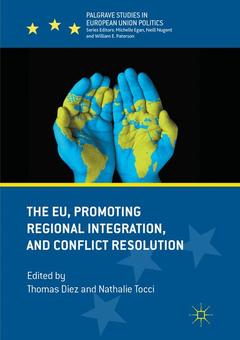The EU, Promoting Regional Integration, and Conflict Resolution, Softcover reprint of the original 1st ed. 2017 Palgrave Studies in European Union Politics Series
Coordonnateurs : Diez Thomas, Tocci Nathalie

This book provides a comprehensive study into the promotion of regional integration as a central pillar of European Union (EU) relations with the rest of the world. It is a strategy to deal with a core security challenge: the transformation of conflicts and, in particular, regional conflicts. Yet to what extent has the promotion of regional integration been successful in transforming conflicts? What can we regard as the core mechanisms of such an impact? This volume offers a comprehensive assessment of the nexus between promoting integration and conflict transformation. The authors systematically compare the consequences of EU involvement in eight conflicts in four world regions within a common framework. In doing so, they focus on the promotion of integration as a preventative strategy to avoid conflicts turning violent and as a long-term strategy to transform violent conflicts by placing them in a broader institutional context. The book will be of use to students and scholars interested in European foreign policy, comparative regionalism, and conflict resolution.
Thomas Diez is Professor of Political Science and International Relations at the University of Tübingen, Germany. He is the editor of A Different Kind of Power? The EU’s Role in International Politics (2014) and recipient of the 2009 Anna Lindh Award in European Foreign and Security Policy Studies.
Nathalie Tocci is Deputy Director of Istituto Affari Internazionali, Italy, Honorary Professor at the University of Tübingen, Editor of The International Spectator and Special Adviser to EU High Representative Federica Mogherini, on behalf of whom she drafted the EU Global Strategy.
Date de parution : 07-2018
Ouvrage de 336 p.
14.8x21 cm
Date de parution : 02-2017
Ouvrage de 336 p.
14.8x21 cm
Thème de The EU, Promoting Regional Integration, and Conflict... :
Mots-clés :
conflict transformation; EU involvement; EU foreign policy; comparative regionalism; Conflict in the Middle East; Conflict in North Africa; Conflict in Western and Eastern Afriac; Conflict in Latin America; Conflict in Asia; international role of the EU; EU's impact on international affairs; european union politics



